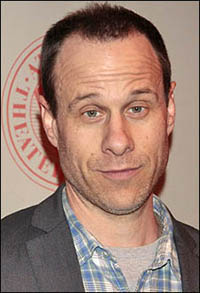
*
It has been said that moral ambiguity clings like an overcoat to the characters in Stephen Belber's plays, but the author doesn't see it that way. He just likes a good fight, an even match: "I think I'm not looking for a moral gray area but looking for a dramatic conflict where both sides of the conflict are very strong and are both sides that I can personally sympathize and empathize with. I definitely feel like I want to write both sides of a conflict really strongly, and I have to find my way into them."
Don't Go Gentle, he says, "is the best example." His latest opus is getting its world premiere by Off-Broadway's MCC Theater, opening Oct. 15 at the Lucille Lortel Theatre in Greenwich Village.
"The two sides are this question of Michael Cristofer's character wondering what his legacy will be in terms of family. He kinda creates this new family around him, comprised of Angela Lewis and Maxx Brawer, while his real blood family (David Wilson Barnes and Jennifer Mudge) are feeling, 'Wait a minute! That's not quite fair.'
"It has to do with: Has he a right to start over? Does he have a right to try to make amends for mistakes he has made with a whole new batch of people — or should he try to make amends with the people he screwed up with the first time? There are pros and cons to both sides. Who deserves to be helped more? How is his character capable of helping? As they argue, I literally want my sympathies to go back and forth, back and forth, with every line. I want to find a situation where I can create a healthy, vibrant, vigorous debate about the best way to live and the best way to die." Belber has worked with his designated director before (on Geometry of Fire, for example). "She's pretty cute," he says of Lucie Tiberghien, the director — his wife. "We're not right for every project that comes down the pike, and we're very aware of that, so we never try to force it, but this one is just so right. Lucie had been developing it with me early on in some readings. It's something she connects to — something we happily discuss 24 hours a day and think about it lots, not just when we come together at rehearsal."
| |
 |
|
| Stephen Belber | ||
| photo by Joseph Marzullo/WENN |
"Every time I go to L.A. — and I've been working all these movies, and none of them are getting made — everybody is saying, 'You're crazy for not doing television. This is the golden age of television. What are you doing, trying to write movies?'"
Apparently Off-Broadway, where Belber does his most and best work (Dusk Rings a Bell, Tape, Fault Lines), is beyond these advisors' purview, but it's home for him, and having deposited his token attempt at TV, he has quickly relapsed into old habits.
He expects to be back Off-Broadway next with The Power of Duff, about an upstate anchorman who gets religious on the air and rocks Rochester with what are perceived as miracles.
"It was a big movie sale for me seven years ago and got me a lot of work. It was to be Ron Howard and Russell Crowe, but that didn't happen. Marc Platt bought it for Universal, then asked me to turn it into a play, which wasn't easy. In theatrical form, it sill ended with 62 scenes, but it went over well this summer at Vassar's New York Stage and Film" — with Greg Kinnear in his first stage acting ever, and a crackerjack supporting cast (Dominic Fumusa, Neal Huff, Jennifer Westfeldt, Ilana Levine, Desmin Borges) that could accompany him to New York. Come November, Belber will adapt and direct the film of his single Broadway bid — Match — with Patrick Stewart in Frank Langella's Tony-nominated role of an effete ballet teacher and possible parent.
"Broadway is definitely more pressure," he recalls with a shiver. "You're still learning about the play, and, halfway through previews, I was trying to rewrite it. I welcome another stab at it because, for this movie, I've learned there's more there. I just ran out of time on Broadway."
Belber began playwriting by writing solo shows for himself and, as a result, is a cut above most playwrights in the acting department. In the two Laramie Project plays, where he researched, co-wrote and performed, he's the bartender who served Matthew Shepard his last drink and a quasi-wise town soothsayer; in its ten-year sequel, he's more or less himself interviewing one of the killers. Both plays will return in rep at BAM for ten days in February, and Belber's excited about being on the boards again. "I do feel my limited acting experience has absolutely made me a better writer."
(This feature appears in the October 2012 issue of Playbill magazine.)








